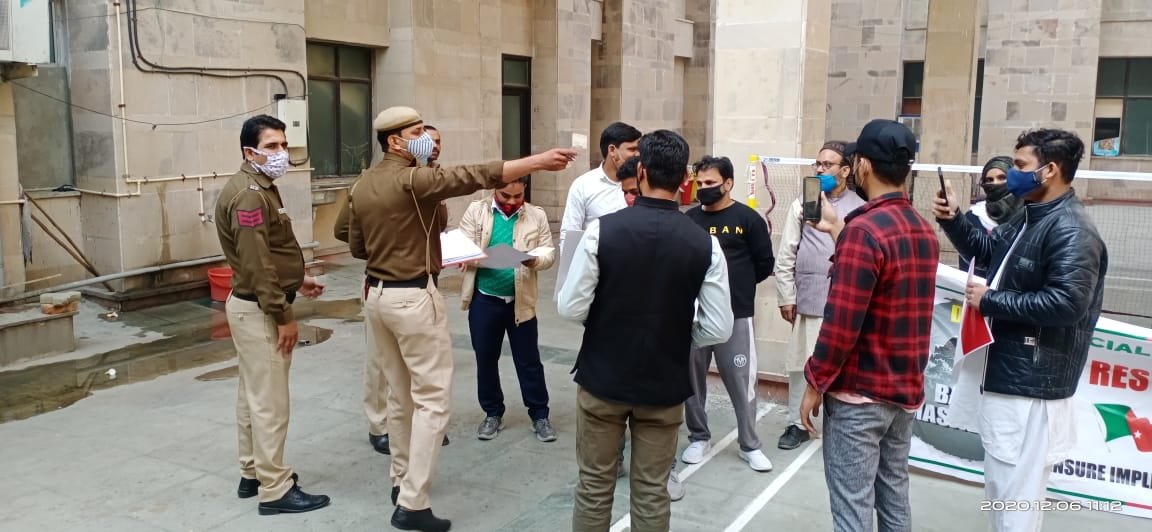
Scores of people on Sunday morning attempted to march from Mandi House to Jantar Mantar in New Delhi but the police stopped them from going ahead
Zafar Afaq | Clarion India
NEW DELHI — On this day 28 years ago, a frenzied mob of Hindu extremists descended on the town of Ayodhya in Uttar Pradesh and demolished Babri Masjid, a Mughal-era mosque, in broad daylight in a wanton act of vandalism aimed at constructing a temple of Ram at the spot.
For years, the Muslims and secular groups would hold events to observe December 6, the 28th anniversary of the Babri demolition, as a ‘black day in the history of Independent India’.
Keeping with the trend, scores of people on Sunday morning attempted to march from Mandi House to Jantar Mantar in New Delhi but the police stopped them from going ahead.
“I was addressing the gathering when the police came and snatched away my mic,” SQR Ilyas, a core member of the All India Muslim Personal Law Board which fought the case in the court, told Clarion India.
The march was organised by 17 groups to commemorate the demolition of the mosque. “We are doing according to the routine that we follow every year but the police did not permit us to proceed,” Ilyas said.
Hitherto, the police would allow the march to proceed smoothly but this time many of those who were part of the march were detained by the police.

The anniversary was observed as black day in Hyderabad and other parts of Telangana on an appeal by various Muslim organisations. Shops and business establishments were closed in some localities.
Last year on November 9, the Supreme Court of India passed a verdict clearing the way for construction of the Ram temple and this year on August 5, Prime Minister Narendra Modi laid the foundation stone for construction of the Hindu shrine.
Leaders of the Sangh Parivar who instigated the mob with provocative speeches were exonerated of any crime by a CBI court this year for lack of evidence.
Muslims felt that the court let them down and upheld the sensibilities of the majority. Ilyas, who is also a lawyer, said the judgement passed by the apex court was strange. “The judgement says the mosque was not constructed after demolition of any temple but then allows construction of the temple. It is strange.”
The court had ordered a plot five acres of land to Muslims for construction of a mosque in compensation for the loss they experienced due to demolition.
Muslims feel betrayed by “secular” parties like the Congress for aiding the Sangh Parivar to run a campaign against Babri Masjid. “Congress facilitated the demolition of Babri Masjid. They were in power but they did not stop the mob,” said Ilyas.
Some people have suggested the idea that Muslims should now move on but Ilyas said that the struggle for justice would continue. “It is not just about Babri Masjid. Our struggle is about religious freedom in India; our struggle is about justice and we cannot forget history and move on. We have to highlight the injustices done to the Muslims and tell this to our future generations.”
He said the Babri Masjid case taught Muslims that one should not concede one’s his rights for the sake of fraternity and religious tolerance because it gives birth to conflicts.
Harsh Mander, a human rights activist, said that he did not agree with those who asked Muslims to move on. “The symbolism of the Babri Masjid demolition was not about one mosque but it was about the terms on which Muslims would have to live in India. The democratic institutes of the country failed to secure justice and, therefore, we need to resist and battle for justice.”
Meanwhile, in Ayodhya, the annual “Yaum-e-Gham” or the ‘day of sorrow’ was cancelled and the business in the town ran like any other day.
Speaking with Clarion India, Haji Mehboob, one of the litigants in Babri Masjid case, said, “The court has given verdict in favour of Hindus and there is nothing we can do now.”
The day would be marked by hoisting flags on Muslim homes and would assemble at the Tedi Bazaar residence of Mehboob.
“There were also instructions from the government to not hold any events,” Mehboob said.
However, Quran reciting events were held at at different mosques of the town in memory of those killed following the December 6, 1992 demolition.
Mehboob recalled that he and other litigants had refused to accept the alternative land granted for construction of the mosque on the outskirts of the town.

